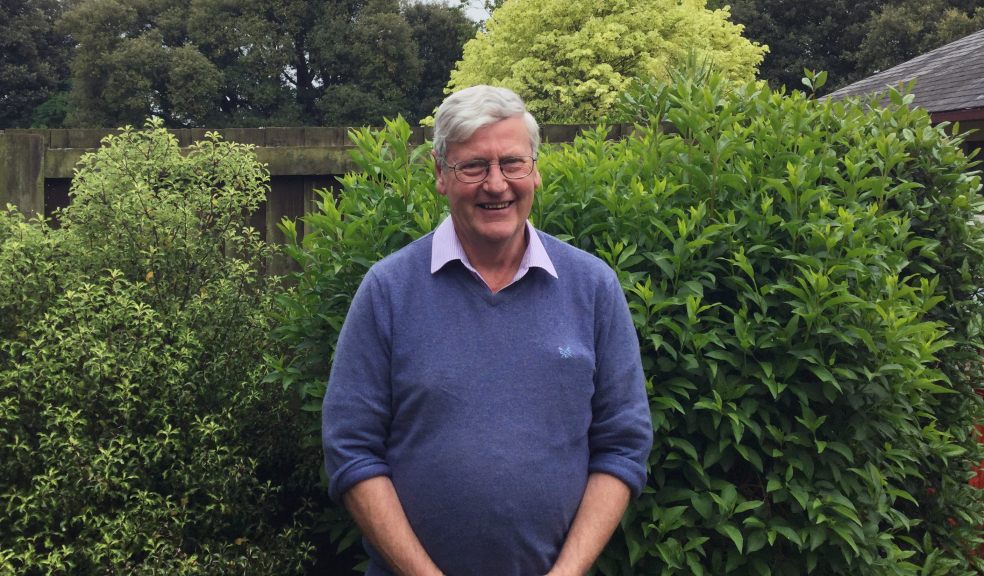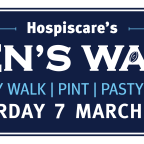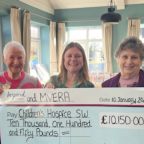
Doctor John Rutter Reflects on the Last 35 Years of Hospiscare
As 2017 draws to a close, the year when local charity Hospiscare celebrated its 35th Anniversary, Dr John Rutter who worked for the organisation in the early 80s is back working there again now at the age of 69. He reflects on how it all started and looks back on his own career to share his thoughts on caring for patients with a terminal illness.
Dr John, who is married and has five daughters, has always lived in Exeter. He recalls: “Back in the 1980s I was caring for the father of one of my friends. He was dying of cancer. I remember visiting him throughout the night and administering injections every four hours through the night and day, thinking there has got to be a better way to die than this.
“When one of the founders of Hospiscare, John Searle, approached me about joining the organisation I thought to myself, yes, this has got to be the way forward. I was one of a large group that turned out in January 1982, to the initial public meeting at the Guildhall to discuss the launch of Hospiscare in Exeter.
“Shortly after, I went on a palliative care course and my family recall not being able to pin me down for at least two weeks after. I had so many ideas flowing through my head on how we could improve patient care.
“So that’s how it all began, I was here from day one. I was the medical adviser for the hospice, and met the CPCT in the evening and then Wednesday afternoons until the hospice opened and Jim Gilbert was sensibly appointed Medical Director. At one stage 17 years ago, I came back as an Assistant Palliative Care Doctor for 5 years but at the time I also worked for Devon Doctors and in general practice. It wasn’t unusual to be clocking up 105 hours a week. But after five years something had to give, and I left Hospiscare to focus on general practice.
“Doctoring runs in my family, my father Frank Rutter was an Ophthalmic Surgeon in Exeter. One of my earliest memories was around the age of eight waiting for my father after school. I was sitting in the doctor’s surgery waiting room and my father came out to call in the next patients.
“He said ‘Would the little mountain range come in please?’ No one responded, so he repeated it, ‘Would the little mountain range come in please?’ Again no response so he relented and used the patient’s proper name, ‘Would Mr and Mrs Hill come in please?’ I found this very funny as did my father, but apparently Mr and Mrs Hill didn’t seem to share our sense of humour. However, it stuck with me because my father said, ‘John, you’ve got to remember people are becoming numbers and they are not numbers. They are people.’
“I got my own sense of humour and perspective on life from my father, my parents taught me to treat everyone equally.
“You have to be built a certain way to work in end of life care, it’s not for everyone. You know that in some small way what you do has a positive effect on a patient, but probably more importantly it has a positive effect on the family around them. Having an empathetic approach enables us to do it. Empathy not sympathy. If a patient makes you feel upset or angry it’s usually a reflection of how they feel themselves. So I always try to be aware of how people feel.
“As much as we can, we try to prescribe a good death. When I think back on old obituaries that used to say things like ‘fought pain bravely’, I realise the improvements in how we can care for people since I qualified have been enormous. We can’t always eliminate pain but our ability to treat it and empathise with the patient has altered end of life care dramatically. Medication is more advanced and keeping patients and relatives informed as things progress is so important. Explaining what is happening and talking to the families is a key part of our approach.
“When I retired from general practice at 67, I came back to work at Hospiscare and have been back here for just over two years. I’m on the bank staff so I get called in whenever they need me.
“I used to ask my patients in the general practice, ‘You tell me what you think a hospice is like?’ They always answered; dark, depressing, people talking in hushed tones and full of dying people. But the complete opposite is true. The ward at Searle House is light and airy. There is light-hearted banter despite taking your care seriously. Pets come and visit their owners, people get married on the ward, and lives are still being lived. I encourage people to come in as a visitor themselves and find out first hand, they are always pleasantly surprised.
“Every now and then I get a reminder of why I enjoy working here so much. I got a letter the other day from the wife of a young patient and it said ‘don’t underestimate your kindness.’
“I have many happy memories of working at Hospiscare. My colleagues are a great bunch. In the early days one of the nurses I used to work with, Kerry McNish, called me up and said, ‘John, I’ve got some news for you, and you may not be particularly pleased.’ She had applied for a place in the London Marathon on my behalf and I knew nothing about it! So I ended up running in both the 1991 and 1992 London Marathons and raising over £10,000 for Hospiscare.
“I don’t feel 69 years old. My father retired at 82 so working past retirement age is another trait that runs in the family. I do a lot of walking and am a group leader for the Ten Tors and Duke of Edinburgh training teams. I like to sail and stay active. I don’t have any strong religious beliefs, but I do believe fundamentally you can in some small way help individuals. My wife says going round the supermarket with me is a nightmare as I get stopped by patients all the time for a chat, which I love. So I hope something I have done in the past is alright.
“Hospiscare is such a lovely place to work. You are surrounded with people who have the same mind set. Although there is a hierarchy you wouldn’t necessarily know it. Everyone has an input, the ward cleaners, visitors, nurses – everyone is equal.”
Hospiscare is a local adult hospice charity, providing free, high quality care and support to people with any type of terminal illness, and those close to them, in Exeter, Mid and East Devon. A gift to Hospiscare in your Will helps to ensure the future of the charity in Devon for generations to come.




















